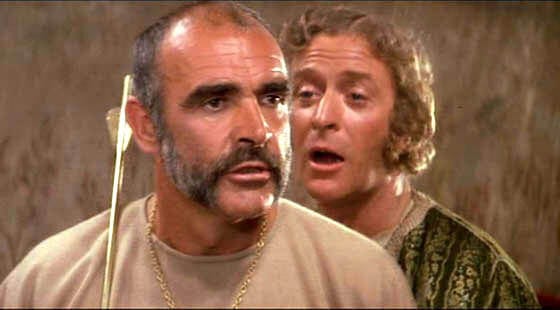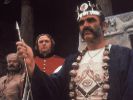Eye For Film >> Movies >> The Man Who Would Be King (1975) Film Review
The Man Who Would Be King
Reviewed by: Jeff Robson

As Sean Connery seems determined to remain in retirement from acting (thanks very much, everyone involved in The League Of Extraordinary Gentlemen) it does at least afford a breathing space to consider his career.
There have been a few misfires (Zardoz) and over-ambitious failures (The Offence), but all in all it’s a hugely impressive body of work. As well as him being the driving force behind the most successful movie franchise ever, most film buffs could rattle off half a dozen non-Bond gems without even having to think very much. And The Man Who Would Be King would surely be one of them.

The special showing at the Edinburgh International Film Festival as a tribute might, with any luck, prompt a more widespread cinema release or a bells and whistles DVD. If not, it’s a glorious excuse to see a masterclass in screen acting and old-style narrative filmmaking on a big screen with a big sound system. But this late Huston masterpiece is far more than a standard Seventies big-name blockbuster.
Adapted from a short story by Rudyard Kipling it begins in India at the height of the British Raj, with Plummer, as the author, encountering two tough and shrewd ex-British Army sergeants, Daniel Dravot (Connery) and ‘Peachy’ Carnehan (Caine) through his work as a newspaper correspondent. They share Kipling’s love of India, and have stayed on to try to make some easy money. Thwarted in a blackmail scheme, they resolve to journey through Afghanistan to the even more remote and lawless country of Kafiristan, said to be the site of a lost city of stupendous wealth. They call on Kipling for help (through the trio’s shared Masonic connections) and ask him to witness a contract in which the two pledge loyalty to each other, and an even share of any booty. Kipling urges them to reconsider, as no European traveller has ever returned from Kafiristan, but they press on regardless. Their initial journey proceeds as a fairly conventional adventure tale, with the two surviving avalanches and bandit skirmishes to arrive in the mysterious country.
There they encounter Billy Fish (Jaffrey), a Gurkha soldier who is the sole survivor of a British surveying expedition. He acts as their translator and general factotum as they devise a plan: to recruit a minor tribe as their army and, using their military know-how, conquer the country before looting it “seven ways from Sunday”. But in the first battle, Daniel appears to miraculously escape death when an arrow lodges in the ammunition bandolier across his chest. The natives instantly believe him to be a god and he is invited by the priests of Kafiristan’s chief city to become the country’s ruler.
They arrive to find the city as majestic as all the reports suggested, and stuffed to the rafters with treasure. It has been held in trust for the heir of ‘Sekundar’ – Alexander the Great, who visited the region on his last, doomed campaign, and has been worshipped in Kafiristan ever since. As Daniel has proved himself the son of a god, it is his to do with as he will. Peachy is all in favour of cramming their saddlebags full and hightailing it back down the Khyber Pass. But Daniel has come to enjoy the trappings of power and sees himself building his own empire in Kafiristan, even to the extent of treating Queen Victoria “as an equal”.
On the face of it, this all sounds distinctly non-PC. But those who dismiss Kipling (and indeed Huston) as an old-fashioned imperialist are somewhat wide of the mark. This is a cautionary tale about the dangers of pride and unblinking, assumed superiority over another race – and perhaps also a barbed comment on the desire for plunder that underpinned the colonial ‘triumphs’ of the British and other empires. In the end Daniel and Peachy’s fates are completely dependent on the trust of the people of Kafiristan – and Huston makes clear they’ve not really done much to earn it.
It’s also one of the great ‘buddy pictures’, though that label is too knockabout. This is about friendship at the deepest level, between two contrasting characters who need each other deeply but (being men, and Brits, and Victorians, of course) can never say it. But when you’ve got two great screen actors at the top of their game, you don’t always need words. The scenes where Connery and Caine realise their ways must part for ever and they accept fate with their usual gruff camaraderie, are undeniably moving. But the duo’s position is still a precarious one, and events ... well, if you’re one of those lucky people about to see this film for the first time, I shall say no more. Except that the climax manages to be both superb action cinema and a gloriously poignant celebration of loyalty, friendship and true bravery.
Connery is at the heart of all this, of course, though in fact he’s not the main plot driver. Caine’s Cockney guttersnipe gone East is the one who initiates the schemes and is constantly thinking ahead. Connery is his strong right hand, quite innocent in some ways, but unremittingly loyal. There’s an air of the Holy Fool about him as he becomes ruler and faces the prospect of emerging from under Peachy’s shadow. The mixture of arrogance and good-hearted common sense he displays when ruling on tribal disputes is genuine acting, building a subtle and nuanced character portrayal as much through gesture and expression as dialogue. Of course, he still retains the feral charisma and old-fashioned star power of the Bond era, but as in the best pictures of his “middle period” (such as Robin And Marian and A Bridge Too Far) they’re tempered with the world-weary gravitas of an eternal warrior realising that age is the greatest enemy.
It’s testimony enough that he puts a cracking Caine performance (mixing toughness and vulnerability in equal measure, as always) into the shade somewhat. The supporting characters are pencil-thin by comparison, with the depiction of Jaffrey’s unswervingly obedient ‘Johnny Gurkha’ perhaps a little too much of its time. And the female characters are conspicuous by their absence – with the exception of Caine’s wife Shakira, who serves a crucial plot function but otherwise has little to do but look decorative.
For those reasons (and only those) the film narrowly misses five-star status. But it’s still an amazing piece of work. All the more so, considering the crew never went anywhere near India. All the location work was done in Morocco, which looks spectacular but (on close umpteenth inspection) not that much like the subcontinent. I suspect the logistics were less daunting, and there was an assumption that the Seventies punters queuing up at a suburban Odeon in the rain wouldn’t notice over much. The opening wordless scene still remains a visually stunning paean to the East.
It was a labour of love for Huston, pursued doggedly over the years. There were plans to cast Burt Lancaster and Kirk Douglas, and at one point Redford and Newman were mentioned. Both combos could have worked, but I’m not too unhappy with the final pairing. It’s certainly a great showcase for two great leading men, but the director’s love of the East, of Kipling and British culture and great storytelling shines through as well. And in the ambivalent, ultimately tragic but still heroic, figure of Daniel there’s more than a hint of Bogart in two of Huston’s early classics, Treasure Of The Sierra Madre and The Maltese Falcon. Kudos too to Maurice Jarre’s score and Oswald Morris’s cinematography.
A rich and rewarding film, then. Hopefully this new screening will make more people see it as more than just a lazy Saturday afternoon TV schedule-filler. If not, it’s still a wonderful way to say to Schir Schean, after all these years: thanks for the memories.
Reviewed on: 18 Jun 2010















